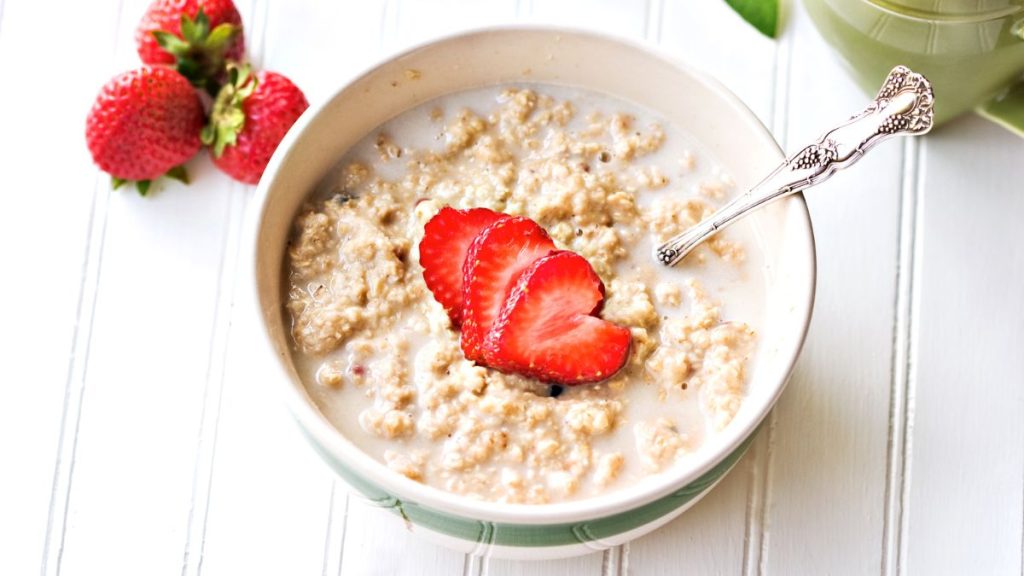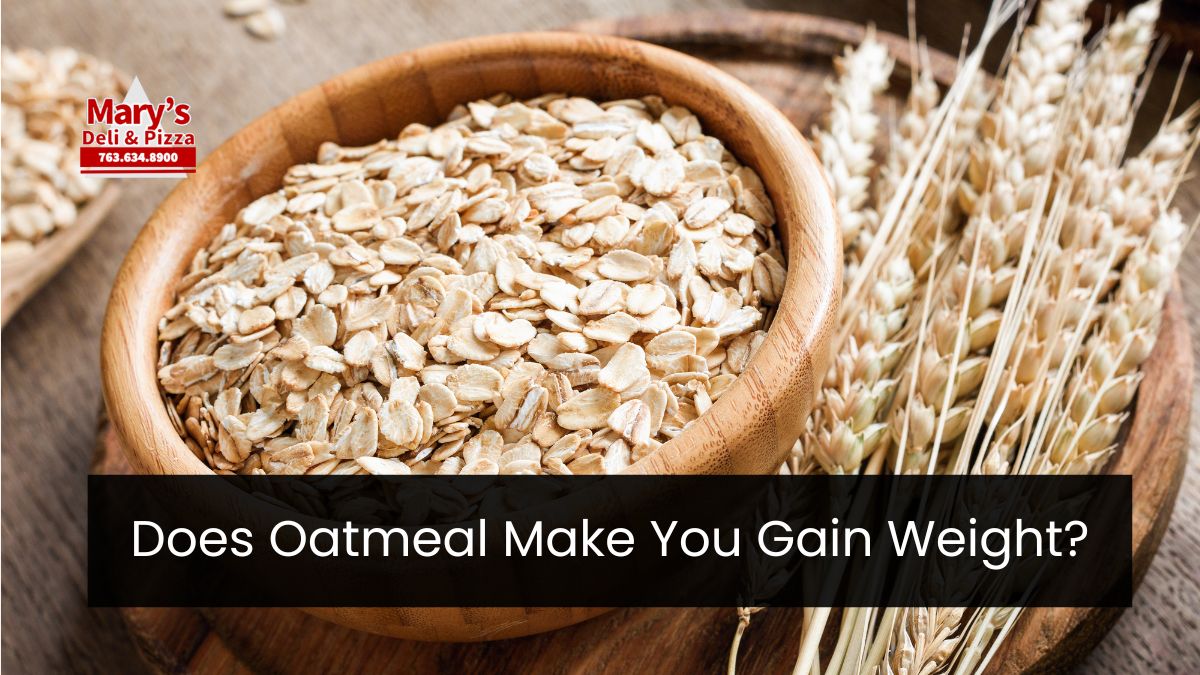Oatmeal is a nutritious and versatile food often included in both weight loss and weight gain diets. Whether it helps you gain or lose weight depends largely on how it’s prepared and the ingredients added.
Oatmeal is packed with essential nutrients like fiber, protein, and vitamins, making it a healthy meal option. With proper modifications, oatmeal can be tailored to suit your specific dietary goals, whether you’re aiming to lose weight or increase your caloric intake.
What Is Oatmeal?
Oatmeal is a porridge made from oats, typically eaten as a breakfast meal. Oats, in their whole form, can take a long time to cook, but most people opt for rolled, crushed, or steel-cut oats, which are easier and faster to prepare.

The convenience of instant oats makes them a popular choice for those who want a quick meal.
To prepare oatmeal, oats are cooked in water or milk until they form a creamy porridge. Oats can also be used in a variety of other dishes, including muffins, cookies, and other baked goods.
Oatmeal And Weight Gain
If you’re looking to gain weight, oatmeal can be a helpful addition to your diet, especially when prepared with nutrient-dense, high-calorie ingredients.
The beauty of oatmeal lies in its versatility — it can be adjusted to fit your caloric needs. Here’s how you can make it work for weight gain:
- Use Milk Instead of Water: Oatmeal made with milk instead of water adds calories and protein to your meal, making it a more filling and nutritious option.
- Add Calorie-Dense Toppings: You can add healthy, high-calorie toppings to your oatmeal. Consider ingredients like:
- Walnuts or Almonds
- Flaxseed
- Natural peanut butter
- Honey
- Dried fruits (e.g., raisins, dates)
These ingredients not only increase the calorie content of your meal but also provide healthy fats, protein, and additional nutrients.
- Opt for Rolled or Steel-Cut Oats: These varieties of oats are less processed than instant oats and can provide a heartier, more filling breakfast.
By making these adjustments, you can achieve a calorie surplus while keeping your diet nutrient-dense and balanced.
Oatmeal And Weight Loss
On the flip side, oatmeal can also be a powerful tool for weight loss. Oats are rich in fiber, particularly beta-glucan, which can help with weight management in several ways:
- Satiety: The fiber in oatmeal delays stomach emptying, helping you feel fuller for longer. This reduces the likelihood of overeating throughout the day.
- Low-Calorie Meal: When prepared with water or unsweetened almond milk and minimal toppings, oatmeal can be a low-calorie, filling meal that supports weight loss.
- Blood Sugar Control: Oatmeal is rich in complex carbohydrates that help regulate blood sugar levels. Stable blood sugar reduces hunger pangs and keeps your energy steady throughout the day, which can prevent unhealthy snacking.
- Nutrient-Rich: Oats are packed with essential nutrients like magnesium, vitamin B1, and iron, making them a great option for a balanced diet.
To maximize the benefits for weight loss:
- Use unsweetened instant oatmeal or rolled oats to avoid unnecessary sugars.
- Avoid high-calorie toppings like nuts and honey if your goal is to reduce caloric intake.
- Add fresh fruits such as berries for natural sweetness, or sprinkle cinnamon for flavor without added calories.
Nutrient Composition of Oatmeal
Oats are one of the most nutrient-dense grains available. In a single cup of cooked oats, you get:
- 51 grams of carbohydrates
- 13 grams of protein
- 8 grams of fiber
- 5 grams of fat
- 303 calories
Additionally, half a cup of dry oats contains:
- Manganese: 63.9% of the Daily Value (DV)
- Magnesium: 13.3% of the DV
- Phosphorus: 13.3% of the DV
- Iron: 9.4% of the DV
- Vitamin B1 (Thiamin): 15.5% of the DV
Oatmeal also provides a modest amount of calcium, potassium, and other essential vitamins and minerals.
The high fiber content, particularly soluble fiber, makes oatmeal a great food for digestive health and regulating cholesterol levels.
Health Benefits of Oatmeal
Oatmeal offers several key health benefits, making it a valuable addition to any diet, whether you’re trying to lose or gain weight:
- Lowers Blood Pressure: The antioxidants found in oats, specifically avenanthramide, help reduce blood pressure and improve overall cardiovascular health.
- Reduces Cholesterol: The beta-glucan fiber in oatmeal has been shown to reduce levels of bad cholesterol (LDL) by promoting the excretion of cholesterol-rich bile. This can lower the risk of heart disease.
- Regulates Blood Sugar Levels: For those with type 2 diabetes or insulin resistance, oatmeal helps stabilize blood sugar levels and improves insulin sensitivity.
- Supports Digestive Health: The high fiber content in oats supports a healthy digestive system, preventing issues like constipation and promoting a healthy gut microbiome.
How To Make Your Oatmeal More Nutritious
To ensure that your oatmeal is as nutritious as possible, follow these tips:
- Avoid Pre-Sweetened Instant Oats: Many flavored and instant oatmeals contain high amounts of added sugar, which can contribute to weight gain. Instead, opt for plain, unsweetened oats.
- Use Spices for Flavor: Instead of adding sugar, enhance the flavor of your oatmeal with cinnamon, nutmeg, or vanilla extract. These spices add depth without contributing calories.
- Watch Your Portions: Overeating oatmeal can add excess calories to your diet. Stick to serving sizes and measure ingredients to avoid consuming more than intended.
- Incorporate Protein: Add Greek yogurt, milk, or a scoop of protein powder to boost the protein content of your oatmeal. This will help you stay fuller longer and support muscle health.
- Add Fruits for Natural Sweetness: Fresh or frozen fruits like blueberries, apples, or peaches can add flavor, fiber, and essential nutrients to your oatmeal.
The Bottom Line
Whether oatmeal makes you gain or lose weight depends entirely on how you prepare it. For those aiming to gain weight, oatmeal can be made calorie-dense with the addition of nuts, milk, and other high-calorie toppings.
On the other hand, individuals looking to lose weight can benefit from oatmeal’s fiber content and low-calorie nature when prepared with minimal added ingredients.
Ultimately, oatmeal can be a healthy, nutritious meal that supports a range of dietary goals when customized to fit your needs.
By making smart choices about how you prepare your oatmeal and what you add to it, you can ensure it fits into your overall weight management strategy.

